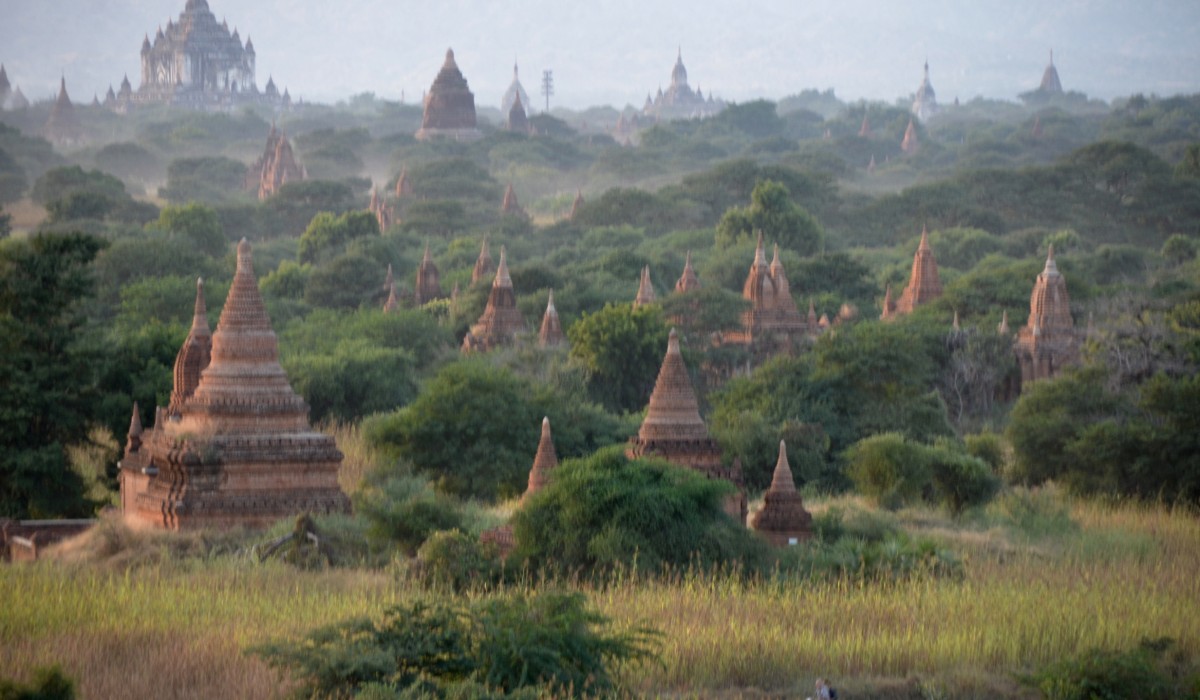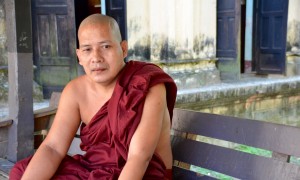
When our lovely river boat, the Belmond Orcaella, pulled up and docked at Bagan in Myanmar, I was surprised to see a very large mansion right off our bow.
Wow, what’s that? I asked myself.
So different from the rag tag shelters we had been seeing for the previous days as we cruised the Irrawaddy River—homes created out of blue tarps and woven bits of bamboo…….looking like the tiniest bit of wind would blow them down.

So, I asked, and was told that it was the private home of Aung San Suu Kye’s brother, the guy she hadn’t talked to in years. Both of them now adult children of Myanmar’s hero—a military leader gunned down when Aung San Suu Kye was 2.
Clearly they had gone different routes: Aung Sung Suu Kye, now a national hero (think Ghandi) for her years of sacrifice and steadfast determination to liberate her country from the military regime who killed her Dad. Her brother, Aung San Oo, apparently, in partnership with that regime, or so our guide on the boat implied. He got a 12,000 square foot mansion on a prime river location in the most famous city in Myanmar.
So, why does this matter? Well, it introduced me to the paradoxes of that this famous city, Bagan, now the undisputed jewel in Myanmar’s tourist crown.
No one goes to Myanmar without going to Bagan.


Less famous than Cambodia’s Angkor Wat, Bagan’s temples were built in its Golden Age — 1000 to 1200—when it was the center of civilization in this part of the world. It was thought to be the biggest city in the world at the time. More than 10,000 Pagodas were built over a several hundred year glorious history.
So why were so many religiously significant Pagodas built?
The city was wealthy and its inhabitants believed building a Pagoda would earn them merit in the the next life—a Buddhist tradition.
There may have a bit of desire to upstage one’s neighbors with a bigger and grander temple or stupa….…kind of a keeping up or surpassing the Jones.
About 2,000 of these remain, drawing tourists from all over the world. They are contained in a 16 mile square area, peaceful and pleasant to visit.
But not without controversy.
One is that this clearly historically significant area has not received World Heritage designation because of inappropriate and possibly incompetent restoration efforts. It bugged the guides we met. Apparently hundreds of ancient sites were shoddily recast — with materials and designs that differed from the originals — rather than authentically restored. The guides we talked to blamed this on the military regime. They did a fair amount of gnashing of teeth and muttering about it.
Earning the Unesco World Heritage status is the gold standard of historical sites.
They also aren’t happy with the ugly viewing tower….again…..designed to appeal to tourists without recognition of the historical significance of the area. The 200-ft. viewing tower was built in 2003 hovering higher than any other temple in the area. It was commissioned by Tay Za, one of Burma’s most notorious tycoons, and visitors are charged to view from its imposing heights. It may prevent Myanmar from earning the coveted World Heritage Status in the future.
Interestingly, the question one needs to ask: do the locals care? They visit the beautiful temples to practice their religion. The label of World Heritage Site probably wouldn’t provide any additional benefit for those who visit temples to worship.
Recently, the government banned climbing on them. In my book, this was a wise decision. There’s a real potential for injury as hundreds clamor up crumbling temples with no railings or regular steps. But the ban was lifted when tourist companies and their guides protested. Claiming the ancient structures to watch the sunsets can be a mystical experience as well as a frenzy of selfie taking and souvenir hawking.

Regardless of whether or not it is ever granted UNESCO World Heritage Status, it will undoubtedly remain a unique religious site that will be visited for generations to come while archeologists unravel a civilization long gone.





















Comments
3 CommentsMichelle Slikkers
May 10, 2016Susan, “Bravo” on yet another fabulous photographic journal of your exotic travels. Thanks for sharing.
Susan J. Smith
May 10, 2016Thanks, Michelle, appreciate your comment. I’m glad you enjoyed.
River Cruising in Myanmar | DesignDestinations
Jun 13, 2016[…] Bagan, Myanmar: a mysterious place to visit […]